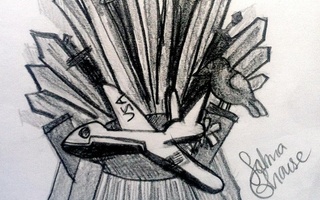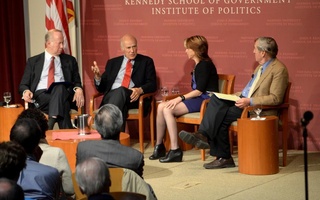The last time a Harvard man and a Yale man faced off in a presidential election, the year was 1912, and neither candidate won.
That November, Princeton graduate Woodrow Wilson edged out Theodore Roosevelt, Jr., Class of 1888, and William H. Taft of Yale to clinch the presidential title.
Seventy-six years later, as the nation prepared to head to the polls again to choose a leader for the next four years, another Harvard-Yale contest was brewing—this time, between Harvard Law School graduate Michael S. Dukakis and Yale graduate George H. W. Bush.
But for Dukakis, a former Kennedy School professor and Governor of Massachusetts at the time, the school rivalry was a non-issue in the race.
“The Harvard-Yale rivalry really kind of meant nothing to me,” Dukakis said in an interview with The Crimson.
And although students at Harvard also failed to see the race as an Ivy League rivalry, the subject of Dukakis’s educational background made headlines across the nation.
The Harvard-bashing started soon after then-Vice President Bush safely secured the Republican presidential primaries. At the Texas Republican Convention in early June, Bush accused the Massachusetts democrat of being soft on foreign policy, claiming that his opponent’s views, “born in Harvard Yard’s boutique, would cut the muscle of our defense.”
“Out of that Yard comes a specific Massachusetts liberalism,” Bush told reporters the next day, calling Harvard “a philosophical cult” that encouraged extreme left-wing thinking among its students.
The Dukakis campaign dismissed these comments at the time, a decision that he stands by to this day. “Look, I was a public school kid, went on to Swarthmore, and then eventually to Harvard Law School... the guy never stepped foot in a public school,” Dukakis said.
“I thought it was silly, I thought it was ridiculous, and I didn’t think the public was interested and I think I was correct in all of those assumptions.”
Dukakis explained that by the time he entered the Law School, he already had a “pretty well-developed political philosophy,” and that his time as a student at Harvard did not significantly affect his political views.
“It’s not the Law School that transformed my views in any way,” Dukakis said, adding that the most important thing he learned was to never hesitate in challenging conventional wisdom.
Even if Dukakis’s time at Harvard did not influence his views, Dukakis did benefit from the wide access to University faculty that came with his Harvard pedigree.
HKS professors such as Joseph S. Nye, Jr. and Graham T. Allison ’62 joined the Dukakis campaign as advisors while then-HLS professors Christopher F. Edley, Jr. and Susan R. Estrich served as the issues coordinator and the campaign manager, respectively.
“I certainly made use of every person at the school who was interested, and a lot of them were involved,” Dukakis said.
Read more in News
Shadows of Black Monday Felt on CampusRecommended Articles
-
 Michael S. Dukakis
Michael S. Dukakis -
Iraq: The Deception at a DecadeAlthough nothing of a cheerleader for Obama administration foreign policy, I could not help but writhe with contempt over Beck’s newest outburst of on-air mania.
-
 Game of Drones
Game of Drones -
 Professors Discuss Meaning of Presidential Leadership
Professors Discuss Meaning of Presidential Leadership -
The Latest Political PivotIf Obama’s June announcement—that the United States will begin funneling arms to Syrian rebels in an attempt to help them fight off the armies of Syrian president Bashar al-Assad—says anything, it’s this: Iraq still hangs on America’s mind. A seven-year occupation may be over, but the impact of the war is heavy.
-
The NSA and America’s Accountability ProblemIn fact, the NDAA is only one instance of a festering government problem since Iraq—the dramatic, Congress-sanctioned, expansion of executive power.













